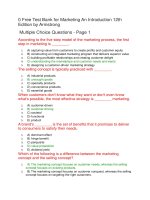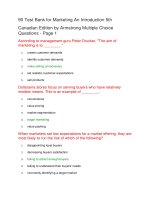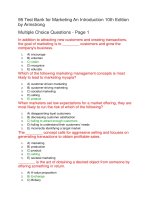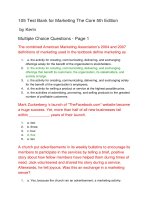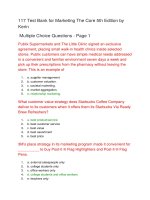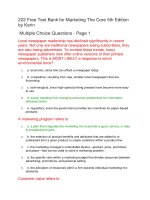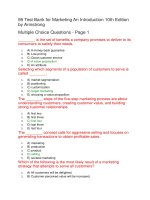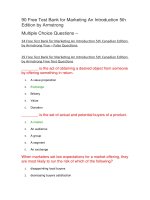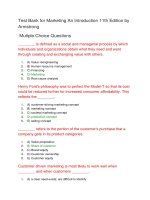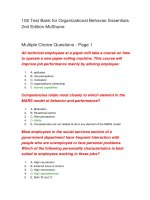105 test bank for marketing the core 5th edition
Bạn đang xem bản rút gọn của tài liệu. Xem và tải ngay bản đầy đủ của tài liệu tại đây (79.78 KB, 24 trang )
105 Test Bank for Marketing The Core 5th Edition
by Kerin
Multiple Choice Questions - Page 1
The combined American Marketing Association’s 2004 and 2007
definitions of marketing used in the textbook define marketing as
1.
2.
3.
4.
5.
a. the activity for creating, communicating, delivering, and exchanging
offerings solely for the benefit of the organization’s stockholders.
b. the activity for creating, communicating, delivering, and exchanging
offerings that benefit its customers, the organization, its stakeholders, and
society at large.
c. the activity for creating, communicating, delivering, and exchanging solely
for the benefit of the organization’s employees.
d. the activity for selling a product or service at the highest possible price.
e. the activities of advertising, promoting, and selling products to the greatest
number of profitable customers.
Mark Zuckerberg ‘s launch of “TheFacebook.com” website became
a huge success. Yet, more than half of all new businesses fail within
__________ years of their launch.
1.
2.
3.
4.
5.
a. two
b. three
c. four
d. five
e. ten
A church put advertisements in its weekly bulletins to encourage its
members to participate in the services by telling a brief, positive
story about how fellow members have helped them during times of
need. Jack volunteered and shared his story during a service.
Afterwards, he felt joyous. Was this an exchange in a marketing
sense?
1.
2.
a. Yes, because the church ran an advertisement, a marketing activity.
b. No, because the church is nonprofit organization and these actions are
expected without any expectation of “exchange.”
3. c. No, because no money was exchanged.
4. d. Yes, because sharing his story at a service was exchanged for a feeling of
joy.
5. e. No, because the church did not provide Jack with a tangible product or
service.
Whether an individual is buying for personal or household use, or
an organization is buying for its own use or for resale, the individual
or organization would be considered
1.
2.
3.
4.
5.
a. a prospective customer.
b. a dual-purpose marketing decision maker.
c. a potential distributor.
d. an informed buyer.
e. an end-user.
To serve both buyers and sellers, marketing seeks to discover and
__________ the needs and wants of prospective customers.
1.
2.
3.
4.
5.
a. change
b. satisfy
c. create
d. manipulate
e. preserve
Which of the following statements about marketing activities is
MOST ACCURATE?
1.
2.
3.
4.
5.
a. Marketing is affected by society but rarely, if ever, affects society as a
whole.
b. The marketing department works closely with other departments and
employees to implement an organization’s marketing activities.
c. Marketing activities are the sole responsibility of the marketing department;
other departments are involved only if there is an emergency (such as a
product recall).
d. Environmental forces do not affect marketing activities as long as a firm
closely monitors its environment through rigorous market research.
e. Marketing is essentially developing the right product and convincing
potential customers that they “need” it, not just “want” it.
The marketing department of an organization is responsible for
facilitating __________.
1.
2.
3.
4.
5.
a. relationships, partnerships, and alliances with the organization’s customers,
shareholders, suppliers, and other organizations
b. healthy competition with other product manufacturers
c. financial contracts with banks and other lending institutions
d. alliances with firms with non-competitive products that target similar
markets
e. the coordination between the various departments within the entire firm
A student wants to buy a smartphone so she can share pictures
with her friends. An insurance claims adjuster wants to buy a
smartphone to document accidents (take pictures, write a report,
etc.). If they both purchase the same model smartphone, such as
an Apple iPhone, which statement is MOST ACCURATE?
1.
2.
3.
4.
5.
a. The adjuster is a prospective customer because the smartphone will be
used for work; the student is only a secondary user since the purpose of the
smartphone is just for entertainment.
b. Both the adjuster and the student are potential customers because in their
own way, they both benefit from the smartphone.
c. Neither the adjuster nor the student is a prospective customer since the
company will pay for the adjuster’s smartphone and the student’s parents will
pay for hers.
d. The student is the prospective customer since there are more students
buying smartphones for personal use than there are insurance adjusters
buying smartphones for business use.
e. Only a person who has bought a smartphone previously is a prospective
customer because only previous owners of smartphones benefit from buying
new ones.
The trade of things of value between buyer and seller so that each
is better off after the trade is referred to as __________.
1.
2.
3.
4.
5.
a. financial remuneration
b. exchange
c. countertrade
d. barter
e. marketing
Which of the following statements about marketing is MOST
ACCURATE?
1.
2.
3.
4.
5.
a. Unless you take a marketing class, you will never truly know anything about
marketing.
b. Marketing is nothing more than common sense.
c. Marketing requires an innate sense of creativity; you either have it or you
don’t.
d. You can call yourself a marketing expert only if you have sold something.
e. You are already a marketing expert because as a consumer, you have
already been involved in marketing decisions.
All of the following are departments in a typical organization
EXCEPT:
1.
2.
3.
4.
5.
a. finance.
b. manufacturing.
c. information systems.
d. human resources.
e. suppliers.
Marketing refers to
1.
2.
3.
4.
5.
a. the production of products or services that will generate the highest return
on investment.
b. the strategies used in the advertising and promotion of products and
services to customers around the globe.
c. the process of identifying target market segments for a product or service.
d. the activity involved in getting a product or service from the manufacturer to
ultimate consumers and organizational buyers.
e. the activity for creating, communicating, delivering, and exchanging
offerings that benefit its customers, the organization, its stakeholders, and
society at large.
From its inception, where did Hamdi Ulukaya, the creator of
Chobani, Inc., want to place Chobani yogurt?
1.
2.
3.
4.
5.
a. the organic foods section of major grocery store chains
b. in warehouse club stores like Sam’s Club or Costco
c. the dairy case of major grocery store chains
d. in mass merchandise stores like Target
e. in both independent organic cooperatives, farmer’s markets, and major
organic grocery stores like Whole Foods or Sprouts
Initially, Facebook targeted which consumer market segment?
1.
2.
3.
4.
5.
a. grade school children ages 6 to 12 years old
b. high school students
c. college students
d. adults with professional occupations
e. senior adults 55 years and older
Which of the following statements about marketing activities is
MOST ACCURATE?
1.
2.
3.
4.
5.
a. Marketing is affected by society but rarely, if ever, affects society as a
whole.
b. The marketing department works closely with other departments and
employees to implement marketing activities.
c. Marketing activities are the sole responsibility of the marketing department;
other departments are involved only if there is an emergency (such as a
product recall).
d. Environmental forces do not affect marketing activities as long as a firm
closely monitors its environment through rigorous market research.
e. Marketing, after all is said and done, is essentially developing the right
product and convincing potential customers that they “need” it, not just “want
it.”
An organization’s stockholders, its suppliers, its employees, its
customers, and society at large all share what in common with
regard to an organization?
1.
2.
3.
4.
5.
a. All are stakeholders and should benefit from the marketing of an
organization’s offering.
b. Everyone has a say in the ultimate design of a product.
c. Everyone is legally culpable if something goes wrong with a product.
d. All have to make some type of direct financial investment in the
organization so it can profitably sell its products.
e. All use the products and/or services marketed by the organization.
All of the following are marketing mix strategies that Chobani has
used to sell its yogurt EXCEPT:
1.
2.
a. develop a new yogurt product line for kids.
b. price the Chobani yogurt line below its major competitors (Yoplait and
Dannon) to increase sales and market share.
3. c. use Facebook, YouTube, and other social media to promote Chobani
yogurt.
4. d. rely on “word-of-mouth to reach new customers.
5. e. employ a spokesperson to open a yogurt bar.
All of the following are environmental forces that affect an
organization EXCEPT:
1.
2.
3.
4.
5.
a. economic
b. geographical
c. social
d. regulatory
e. technological
The entirely new food category Chobani launched in 2005 was
1.
2.
3.
4.
5.
a. Italian-style ragù sauce.
b. Turkish-style cottage cheese.
c. French-style yogurt.
d. Greek-style yogurt.
e. Oriental-style teriyaki sauce.
All of the following are true about marketing EXCEPT:
1.
2.
a. Marketing is a broader activity than advertising.
b. Marketing stresses the importance of delivering genuine benefits in the
offerings of goods, services, and ideas sold to customers.
3. c. Marketing persuades people to buy the “wrong” things.
4. d. When an organization engages in marketing, all stakeholders should
benefit.
5. e. Marketing is a broader activity than personal selling.
The American Red Cross created a series of advertisements to
encourage people to donate blood. After viewing an ad, Amanda
went to the local Red Cross office and donated a pint of her blood.
Amanda returned home feeling happy that she had performed a
good deed. Did an exchange occur in a marketing sense?
1.
2.
3.
4.
5.
a. Yes, because the blood was donated to the Red Cross based on an
advertisement, a marketing activity.
b. Yes, because the donated blood was exchanged for a feeling of
satisfaction.
c. No, because the Red Cross is nonprofit organization.
d. No, because no money changed hands.
e. No, because the Red Cross, a service organization, did not provide
Amanda with a product.
To serve both buyers and sellers, marketing seeks to __________
and satisfy the needs and wants of prospective customers.
1.
2.
3.
4.
5.
a. change
b. create
c. manipulate
d. discover
e. measure
Mizuno designs and sells high quality baseball gloves. Who does
NOT benefit from the firm’s marketing activities for its gloves?
1.
2.
3.
4.
5.
a. a baseball or softball player who purchases a new Mizuno glove
b. the Sports Authority salesperson who sells a customer a Mizuno glove
c. the supplier who provided the leather to Mizuno
d. the shareholder of Mizuno that designs and manufactures the gloves
e. all stakeholders should be benefit from Mizuno’s marketing efforts, even
society at large
Which of the following statements about marketing departments is
MOST ACCURATE?
1.
2.
3.
4.
5.
a. The marketing department should work solely with people within its own
department.
b. The marketing department should suggest where a firm should invest its
money based on its knowledge of the market and environmental forces.
c. The marketing department is only responsible for the 4 Ps, not the 7 Ps.
d. The marketing department is only responsible for market research,
supervision of product development, and product promotion.
e. The marketing department must work closely with a network of other
departments and employees to help provide the customer-satisfying products
required for the organization to survive and prosper.
The activity for creating, communicating, delivering, and exchanging
offerings that benefit its customers, the organization, its
stakeholders, and society at large is referred to as __________.
1.
2.
3.
4.
5.
a. manufacturing
b. advertising
c. marketing
d. selling
e. promotion
The Terrafugia Transition (see the photo above) is a 19-foot, twoseater road-drivable, light-sport aircraft with an anticipated price of
$279,000. The MOST LIKELY prospective customers for this flying
car would include
1.
2.
3.
4.
5.
a. students who attend college at least 500 miles away from home.
b. retired seniors receiving social security.
c. executives for whom time is extremely important.
d. teens who like to try new things.
e. families in need of a second vehicle.
More than half of all new businesses fail within __________ years
of their launch.
1.
2.
3.
4.
5.
a. two
b. three
c. four
d. five
e. ten
In marketing, the idea of exchange refers to
1.
2.
3.
a. the negotiation phase between the manufacturer and the seller.
b. the financial remuneration (monetary payment) for a product or service.
c. the trade of things of value between buyer and seller so that each is better
off after the trade.
4. d. the bartering of products and services between non-governmental
organizations or individuals.
5. e. the practice of swapping products and services for other products and
services rather than for money.
The __________ department of an organization is responsible for
facilitating relationships, partnerships, and alliances with the
organization’s customers, shareholders, suppliers, and other
organizations.
1.
2.
3.
4.
5.
a. purchasing
b. marketing
c. human resources
d. accounting
e. information systems
Which of the following statements about stakeholders is MOST
ACCURATE?
1.
2.
a. Ultimately, the only relevant stakeholder is the ultimate consumer.
b. The suppliers, shareholders, employees, and customers are all
stakeholders of an organization and all should benefit from the organization’s
marketing activities.
3. c. Employees can be stakeholders only if they own shares in their company.
4. d. Suppliers are the most important stakeholders because without them,
products could never be produced.
5. e. The only way to be a stakeholder is to have a financial investment in an
organization’s product, service, or idea.
Which of the following is NOT an environmental force?
1.
2.
3.
4.
5.
a. economic
b. regulatory
c. social
d. commercial
e. technological
Mark Zuckerberg is a co-founder of the social networking website
called __________.
1.
2.
3.
4.
5.
a. Pinterest
b. Groupon
c. LinkedIn
d. Facebook
e. Twitter
Mark Zuckerberg encountered unimaginable success with his
launch of “TheFacebook.com” website from his college dorm room.
By the end of the second week, it had almost __________
members.
1.
2.
3.
4.
5.
a. 100
b. 300
c. 500
d. 1,000
e. 5,000
__________ of all new businesses fail within five years of their
launch.
1.
2.
3.
4.
5.
a. Only 5 percent
b. Only 10 percent
c. Only 25 percent
d. About 40 percent
e. Over 50 percent
A local college of business offers an outstanding graduate business
school education program. Marissa pays the tuition to attend and
earns her MBA with a concentration in marketing management.
Upon graduating, she is offered a high paying, fulfilling position.
Was this a marketing exchange?
1.
2.
a. No, because the university earned a profit from Marissa’s tuition.
b. No, because money was exchanged in the form of tuition and Marissa’s
income will come from her employer, not the graduate school.
3. c. No, because the school did not provide Marissa with a tangible product,
only the potential of an education.
4. d. Yes, because the university promised Marissa she would graduate on time,
and she did.
5. e. Yes, because paying tuition was exchanged for knowledge that directly led
to Marissa’s high paying, fulfilling new job.
Marketing seeks to discover the needs and wants of prospective
customers and satisfy them. Essential to this process is the idea of
exchange, which refers to
1.
2.
3.
4.
5.
a. the trade of things of value between buyer and seller so that each is better
off after the trade.
b. the negotiation phase between the manufacturer and the seller.
c. the financial remuneration (monetary payment) for a product or service.
d. the transport of tangible goods to new owners.
e. the practice of swapping products and services for other products and
services rather than for money.
222 Free Test Bank for Marketing The Core 5th Edition
by Kerin Multiple Choice Questions - Page 2
A business student is preparing for the Graduate Management
Admission Test (GMAT) so he can get into a good graduate
business school. He knows that any money he spends on a tutor
will be well worth it if he can improve his scores. He’s heard that
there is a great tutor in his local community but has no idea who
she is. To ensure that marketing occurs with her, he should
1.
2.
a. buy a GMAT study guide at his college bookstore.
b. find out what the minimum score he needs to get into the graduate
business school of his choice.
3. c. attempt to find the tutor by conducting a Google search for her website,
looking for flyers in the students’ business lounge, obtaining copies of the
college newspaper paper and looking for her ad, or asking his friends whether
they know of her and her tutoring services.
4.
d. consider alternatives to graduate school in case the scores he receives by
taking the test without any help are not sufficient admission.
5. e. apply for delayed admission if he can’t find this tutor.
In a marketing context, a market refers to
1.
2.
3.
4.
a. people with a similar want for a particular product or service.
b. people with both the desire and ability to buy a specific offering.
c. the central location for all buying and selling of products and services.
d. an open space or covered building where vendors convene to sell their
offerings.
5. e. the free the operation of supply and demand.
A local candidate running for office would very much like to have
your vote. She promises that she will “make the country better.”
Because all candidates for public office say this, you decide not to
vote for her. Marketing will not occur in this situation because
__________.
1.
2.
a. marketing doesn’t apply to the voting process
b. the desire and ability to satisfy needs is missing Chapter 01 - Master Test
Bank
3. c. there is no direct way for the parties to communicate
4. d. something to exchange is missing
5. e. there is only one party involved in this situation
Which of the following products mentioned in Chapter 1 of the
textbook failed in the marketplace?
1.
2.
3.
4.
5.
a. Terrafugia Transition
b. Pepsi Next
c. Bell bicycle helmet
d. 3M Post-it Flag+ Highlighter
e. Dr. Care toothpaste
A need refers to
1.
2.
3.
4.
5.
a. a sense of personal inadequacy based upon observations by others around
you.
b. a sense of urgency, which causes a person to take action.
c. a feeling that is shaped by a person’s knowledge, culture, or personality.
d. a feeling of being deprived of something, but not fully understanding what it
may be.
e. a situation when a person feels deprived of basic necessities such as food,
clothing, and shelter.
Four factors are required for marketing to occur: (1) two or more
parties (individuals or organizations) with unsatisfied needs; (2)
__________; (3) a way for the parties to communicate; and (4)
something to exchange.
1.
2.
3.
4.
5.
a. a healthy competitive environment
b. government approval
c. an affordable and actionable advertising campaign
d. a desire and ability on their part to be satisfied
e. an ability to see hidden potential within an environmental force
Four factors are required for marketing to occur: (1) two or more
parties (individuals or organizations) with unsatisfied needs; (2) a
desire and ability on their part to be satisfied; (3) __________; and
(4) something to exchange.
1.
2.
3.
4.
5.
a. a way for the parties to communicate
b. a healthy competitive environment
c. an affordable and actionable advertising campaign
d. a sense of social responsibility
e. an ability to see hidden potential within an environmental force
A factor that might doom a product in the marketplace is referred to
as a(n) __________.
1.
2.
3.
4.
5.
a. albatross
b. land mine
c. pit fall
d. showstopper
e. wild card
For marketing to occur, there must be two or more parties with
unsatisfied needs. Dr. Pepper Snapple Group distributes Country
Time lemonade in cans through supermarkets at a price
comparable to that of soft drinks. The most likely “second” party
needed for marketing to occur would be
1.
2.
3.
4.
5.
a. people who are nostalgic about childhood lemonade stands they had during
hot summers.
b. people with a desire for a beverage other than soda or water.
c. product demonstrators who offer samples of Country Time lemonade to
shoppers at local supermarkets.
d. a local distributor of alcoholic beverages.
e. a nutritionist promoting the benefits of fresh fruit in people’s diets.
A want refers to
1.
a. a sense of personal inadequacy based upon observations by others around
you.
2. b. a powerful desire that causes a person to take action.
3.
4.
c. a need that is shaped by a person’s knowledge, culture, or personality.
d. a feeling of being deprived of something, but not fully understanding what it
may be.
5. e. a situation when a person feels deprived of basic necessities such as food,
clothing, and shelter.
To avoid new-product failure, new-product expert Robert M.
McMath suggests
1.
2.
a. implementing a regional rather than a nationwide rollout of a new product.
b. building a hierarchical organizational structure so that more people have a
chance to spot product problems.
3. c. focusing on customer benefits and learning from the past.
4. d. increasing the marketing budget, since “success comes to those who can
outspend the competition.”
5. e. releasing several different versions of a new product at the same time to
see which one is most successful.
All of the following are examples of products or services that satisfy
a consumer need EXCEPT:
1.
2.
3.
4.
5.
a. a pair of jeans.
b. an apple.
c. a student dormitory.
d. a sports car.
e. a jacket.
All of the following are factors required for marketing to occur
EXCEPT:
1.
2.
3.
4.
5.
a. a desire and ability on the part of two or more parties (individuals or
organizations) to be satisfied.
b. something to exchange between two or more parties (individuals or
organizations).
c. two or more parties (individuals or organizations) with the same wants.
d. two or more parties (individuals or organizations) with unsatisfied needs.
e. a way for the parties (individuals or organizations) to communicate.
The first objective in marketing is to discover consumers’
__________.
1.
2.
3.
4.
5.
a. diversity of opinion to create advertising messages
b. income to determine the most lucrative price point for a product
c. lifetime value of an offering to the organization
d. characteristics that would be useful to segment markets
e. needs to create products that could satisfy them
A farmhand would like to buy a moped scooter to commute to his
job at a nearby ranch. He doesn’t know how to find a dealer though,
and doesn’t have Internet access. Which of the following reasons
explain why marketing fails to occur here?
1.
2.
3.
4.
5.
a. There are not two or more parties with unsatisfied needs.
b. A desire to satisfy a need is missing.
c. No assessments of consumer wants and needs have been made.
d. There is no way for the parties involved to communicate.
e. The ability to satisfy a need is missing.
Suppose you want a snack after taking this exam—a Pan Pizza
from Dominos, which is located across the street from your College
of Business classroom. Unfortunately, you forgot your wallet in the
haste of getting to class on time to take the test. Therefore, you
have no means to pay for the pizza. Which of the following reasons
explain why marketing fails to occur here between you and
Dominos?
1.
2.
3.
4.
5.
a. There are not two or more parties with unsatisfied needs.
b. The ability to satisfy a need is missing.
c. A desire to satisfy a need is missing.
d. No assessments of consumer wants and needs have been made.
e. There is no way for the parties involved to communicate.
A student would like to buy cross-over SUV from a local dealer, but
she thinks the payments will be too high. Marketing does not occur
in this situation because
1.
2.
3.
4.
5.
a. two or more parties have unsatisfied needs.
b. there is no desire on the part of either party to satisfy its needs.
c. one of the involved parties does not have the ability to satisfy its needs.
d. there is no way for each party to communicate with one another.
e. there has been no assessment of consumer wants and needs.
Showstoppers refer to
1.
2.
a. creative or innovative members of a marketing team.
b. unexpected alternative uses for a product that result in a sudden increase
in sales.
3. c. factors that might doom a product in the marketplace.
4. d. a sudden loss of financial backing even though the item is in production.
5. e. a situation when a competitor’s product suddenly beats a firm’s new
product to the marketplace.
Pepsi Next (see the photo above) is a “mid-calorie soft drink
targeted at consumers who want both taste and low calories. A
potential showstopper for this product is likely to be its
1.
a. lack of advertising on television.
2.
b. association with similar mid-/low-calorie soft drinks that have failed in the
recent past, such as Pepsi Edge and Coca Cola C2.
3. c. lower profit margin due the added costs of three artificial sweetener
ingredients.
4. d. cannibalization of Diet Pepsi, which has a much larger market share.
5. e. use of sucrose instead of high fructose corn sugar, which tastes more like
sugar.
Four factors are required for marketing to occur: (1) two or more
parties (individuals or organizations) with unsatisfied needs; (2) a
desire and ability on their part to be satisfied; (3) a way for the
parties to communicate; and (4) __________.
1.
2.
3.
4.
5.
a. an affordable and actionable advertising campaign
b. something to exchange
c. a healthy competitive environment
d. government approval
e. an ability to see hidden potential within an environmental force
New-product experts generally estimate that up to __________
percent of the more than 40,000 new consumable products
introduced in the United States annually “don’t succeed in the long
run.”
1.
2.
3.
4.
5.
a. 33
b. 50
c. 67
d. 75
e. 94
If you followed the suggestions of Robert M. McMath, which of the
following provides the best advice for a marketer, such as Colgate,
when launching a new consumer product, such as toothpaste?
1.
2.
3.
4.
5.
a. Anticipate the future five years out in terms of product form, ingredients,
and packaging—to invent the “toothpaste of tomorrow!”
b. Give the product a mysterious name that is unrelated the product’s benefits
but provokes consumer curiosity.
c. Initiate a Facebook campaign against beverages sweetened with high
fructose corn syrup, which can contribute to tooth decay.
d. Create unusual packaging that has special shelving requirements.
e. Study past toothpaste product failures and learn from them.
Four factors are required for marketing to occur: (1) __________;
(2) a desire and ability of parties to be satisfied; (3) a way for the
parties to communicate; and (4) something to exchange.
1.
a. a healthy competitive environment
2.
3.
4.
5.
b. an affordable and actionable advertising campaign
c. a sense of social responsibility
d. an ability to see hidden potential within an environmental force
e. two or more parties (individuals or organizations) with unsatisfied needs
People with both the desire and ability to buy a specific offering are
referred to as [a(n)] __________.
1.
2.
3.
4.
5.
a. shoppers
b. customer base
c. market
d. bazaar
e. emporium
All markets ultimately are composed of __________.
1.
2.
3.
4.
5.
a. people
b. brands
c. products
d. organizations
e. governments
The Terrafugia Transition (see the photo above) is a flying car with
an anticipated price of $279,000. A potential showstopper for this
product is likely to be
1.
2.
3.
4.
5.
a. concern about damage caused in a small on-road fender bender might
make it dangerous to fly.
b. a lack of marketing towards retired seniors.
c. the efficiency of commuting for corporate executives.
d. the availability of flight instruction for licensed drivers.
e. a very poor product warranty.
A __________ is a need that is shaped by a person’s knowledge,
culture, and personality.
1.
2.
3.
4.
5.
a. desire
b. feeling
c. utility
d. want
e. craving
The two central concerns of marketing are __________.
1.
2.
3.
4.
5.
a. increasing market share and making profits
b. holding down costs while increasing profits
c. developing products and finding suppliers
d. discovering and satisfying consumer needs
e. practicing ethics and sustainability
Marketing discovers consumer needs by
1.
2.
3.
4.
5.
a. implementing a marketing program.
b. conducting effective marketing research.
c. balancing the marketing mix elements—the 4 Ps of the marketing program.
d. advertising to diverse groups of prospective buyers.
e. copying the products and services of competitors.
Which of the following conditions are necessary for marketing to
occur?
1.
2.
3.
4.
5.
a. two or more people, a method of assessing needs, a way to communicate,
and an exchange
b. two or more people, a product, a reasonable price, and a place to make an
exchange
c. a quality product, a fair price, a clever method of promotion, and a place
where a customer can buy the product
d. two or more parties with unsatisfied needs, a desire and an ability to satisfy
them, a way to communicate, and something to exchange Chapter
e. an ability to see a hidden trend within an environmental force, a product,
and an affordable and actionable advertising campaign
Which of the following statements best distinguishes between
consumer needs and wants?
1.
2.
3.
4.
5.
a. Needs are far more influential than wants with respect to marketing
decision making.
b. Wants affect marketing decisions primarily for planned purchases while
needs affect marketing decisions primarily for impulse purchases.
c. Wants occur when a person feels deprived of basic necessities such as
food, clothing, and shelter while needs are determined by a person’s
knowledge, culture, or personality.
d. Needs occur when a person feels deprived of basic necessities such as
food, clothing, and shelter while wants are determined by a person’s
knowledge, culture, or personality.
e. Needs and wants are psychologically the same.
A __________ occurs when a person feels deprived of basic
necessities such as food, clothing, and shelter.
1.
2.
3.
4.
5.
a. desire
b. need
c. utility
d. want
e. craving
222 Free Test Bank for Marketing The Core 5th Edition
by Kerin Multiple Choice Questions - Page 3
A target market refers to
1.
2.
3.
4.
5.
a. customers who have already purchased a firm’s product at least once, have
been satisfied, and are likely to be repeat purchasers.
b. both existing and potential customers who have used a competitor’s
product, are dissatisfied, and who now seek a different product or service to
satisfy their needs.
c. a specific group of current consumers toward which an organization directs
its advertising.
d. one or more specific groups of potential consumers who are seeking a
product for which there are no current substitutes.
e. one or more specific groups of potential consumers toward which an
organization directs its marketing program.
A target market refers to
1.
2.
a. people who could purchase a product regardless of who ultimately uses it.
b. one or more specific groups of potential consumers toward which an
organization directs its marketing program.
3. c. former customers who now use competitors’ products.
4. d. the cluster of benefits that an organization develops to satisfy consumers’
needs.
5. e. people with both the desire and the ability to buy a specific offering.
Which of the following people would MOST LIKELY be the best
target market for tickets to the home games of the Indianapolis
Colts professional football team?
1.
2.
3.
4.
5.
a. all people with an interest in professional football
b. all people in the Midwest who have an interest in sports
c. all men who played on a varsity football team in high school
d. all people in the Indianapolis and surrounding areas interested in football
e. all people in Indiana who watch football on TV
The element of the marketing mix demonstrated when an art gallery
suggests a $2.00 donation at the door is __________.
1.
2.
3.
4.
5.
a. philanthropy
b. place
c. product
d. promotion
e. price
To attend a winter concert presented by the community chorus,
every person had to donate one unwrapped toy at the concert hall
door. This statement is most closely related to the __________
element of the marketing mix.
1.
a. product
2.
3.
4.
5.
b. philanthropy
c. price
d. place
e. promotion
The marketing mix refers to
1.
2.
3.
4.
5.
a. the multiple sales and advertising strategies that can be used to promote a
product.
b. the controllable forces—social, economic, technological, competitive, and
regulatory—to which a marketing manager must constantly adapt.
c. the blending of different communication and delivery channels that are
mutually reinforcing in attracting, retaining, and building relationships with
consumers who shop and buy in traditional intermediaries and online.
d. the marketing manager’s controllable factors that can be used to solve
marketing problems.
e. a set of complementary products that when sold together generate more
sales than when sold separately.
When a company places an ad on Google, the action is a tactic of
the __________ element of the marketing mix.
1.
2.
3.
4.
5.
a. product
b. price
c. promotion
d. place
e. process
The four Ps are commonly known as
1.
2.
3.
4.
5.
a. the environmental or uncontrollable forces.
b. the environmental or controllable factors.
c. the marketing mix or controllable factors.
d. the marketing mix or uncontrollable forces.
e. predict, produce, package, and persuade.
The marketing manager’s controllable factors—product, price,
promotion, and place—that can be used to solve a marketing
problem are referred to as (the) __________.
1.
2.
3.
4.
5.
a. marketing concept
b. marketing mix
c. marketing program
d. environmental forces
e. marketing toolbox
Which of the following is NOT an environmental force?
1.
2.
a. technological
b. regulatory
3.
4.
5.
c. ecological
d. competitive
e. economic
Kraft produces Lunchables, a prepackaged meal usually consisting
of several crackers, small slices of meat, and small slices of
cheese. Other items in the product line contain small bottles of
Chiquita Strawberry Banana Fruit smoothie, Capri-Sun juice, or
Kool-Aid. The box is bright yellow and the quantity of food
contained within it is small. The target market for Kraft Lunchables
is MOST LIKELY:
1.
2.
3.
4.
5.
a. moms with school-age children who pack a simple healthy lunch for them.
b. business people looking for a fulfilling breakfast at the office.
c. business travelers on the run.
d. teenagers who are hungry for an after-school snack.
e. baby boomers who are trying to lose weight.
Which of the following groups would be the LEAST LIKELY target
market for a company producing canned food in single serving
sizes?
1.
2.
3.
4.
5.
a. single adults
b. school kitchens
c. campers
d. senior citizens
e. vending machine owners
The element of the marketing mix that describes a means of
communication between the seller and buyer is known as
1.
2.
3.
4.
5.
a. a product.
b. promotion.
c. the price.
d. the place or distribution.
e. advertising.
The owners of Old School Brand Authentic Antique Foods
researched Civil War records to come up with recipes for the oldfashioned products they market. Concern about the __________
element of the marketing mix would make them eager to be
featured in an upcoming edition of Taste of Home magazine.
1.
2.
3.
4.
a. product
b. price
c. production
d. promotion
5.
e. place
The four Ps of the marketing mix are
1.
2.
3.
4.
5.
a. priorities, personnel, placement, and profits.
b. prediction, production, pricing, and promotion.
c. product, price, production, and place.
d. product, price, promotion, and place.
e. predict, produce, package, and persuade.
The most likely market for cosmetic dentistry, where costs can be
as much as $15,000 for teeth straightening and whitening, is
1.
2.
a. toddlers with crooked baby teeth, when crooked teeth run in the family.
b. all former smokers who have been smoke free for at least one year.
Chapter 01 - Master Test Bank
3. c. anyone who has the time, the money, and the desire to undergo the
procedures.
4. d. anyone who has dental insurance.
5. e. adults who want to make a good first impression for a job interview.
The United States Army recently has been both praised and
criticized for its use of a popular video game, America’s Army, which
is designed to reach potential recruits. The game’s creator, Colonel
Casey Wardynski, wanted to provide a sense of the training and
teamwork one could find in the Army’s military environment. The
game is designed for “boys 14 years or older,” which represent the
Army’s __________.
1.
2.
3.
4.
5.
a. mass market
b. actual recruits
c. restricted market
d. target market
e. untapped market
Which of the following would a marketer use as a synonym for
controllable marketing mix factors?
1.
2.
3.
4.
5.
a. the four Ps of marketing
b. environmental forces
c. macromarketing forces
d. marketing management factors
e. micromarketing factors
TUMI brand briefcases are very expensive, high-end briefcases that
are generally sold in specialty luggage shops. Which of the
following groups of people would be the MOST LIKELY target
market for TUMI brand briefcases?
1.
2.
3.
4.
5.
a. police officers
b. executives
c. construction workers
d. postal workers
e. students
The __________ element of the marketing mix is demonstrated
when a newspaper carrier throws a paper on the customer’s front
porch.
1.
2.
3.
4.
5.
a. place
b. product
c. price
d. promotion
e. procurement
The element of the marketing mix that describes a good, service, or
idea to satisfy consumers’ needs is known as
1.
2.
3.
4.
5.
a. a product.
b. the price.
c. promotion.
d. the place or distribution.
e. a market segment.
The cluster of benefits that an organization promises customers to
satisfy their needs is referred to as a(n) __________.
1.
2.
3.
4.
5.
a. core benefit proposal
b. product protocol
c. marketing program
d. marketing mix
e. customer value proposition
The four Ps are commonly known as
1.
2.
3.
4.
5.
a. the environmental or uncontrollable forces.
b. the environmental or controllable factors.
c. the marketing mix or controllable factors.
d. the marketing mix or uncontrollable forces.
e. predict, produce, package, and persuade.
The ability to buy a soda from a vending machine demonstrates
which element of the marketing mix?
1.
2.
3.
4.
a. product
b. price
c. promotion
d. place
5.
e. process
The marketing mix refers to
1.
2.
3.
4.
5.
a. the selection of product benefits and attributes that are to be added to or
subtracted from a given product to create variations within a product line.
b. the specific ratio within a budget that divides resources between
advertising, sales promotion, and personal selling.
c. the marketing manager’s controllable factors—product, price, promotion,
and place—that can be used to solve a marketing problem.
d. the allocation of resources within a firm towards individual marketing
programs.
e. the environmental forces—social, economic, technological, competitive,
and regulatory—that impact the marketing decisions for a particular product at
any given time.
The marketing mix elements are called __________ because they
are the responsibility of the marketing department in an
organization.
1.
2.
3.
4.
5.
a. uncontrollable forces
b. profitability factors
c. stakeholder value generators
d. target market segments
e. controllable factors
The element of the marketing mix that describes a means of getting
the product to the consumer is known as
1.
2.
3.
4.
5.
a. a product.
b. the price.
c. promotion.
d. the place or distribution.
e. transportation.
The owners of Old School Brand Authentic Antique Foods
researched Civil War records to come up with recipes used in the
old-fashioned cookies the company produces and markets. This
statement deals with which part of the marketing mix?
1.
2.
3.
4.
5.
a. process
b. price
c. product
d. place
e. people
Michelin’s __________ can be summed up as “providing safetyconscious parents greater security in tires at a premium price.”
1.
a. customer value proposition
2.
3.
4.
5.
b. protocol
c. mission statement
d. core values
e. marketing program
A local university offers business courses for a specific target
market composed of people who currently work and want to take
refresher courses to obtain certification in their chosen business
field (marketing, accounting, etc.). Which of the following would be
the most effective way to communicate with the target market,
bearing in mind that communication must be both effective and
economical?
1.
2.
3.
4.
5.
a. put announcements on campus bulletin boards
b. distribute promotional materials during classes
c. advertise on national television
d. advertise on local hip-hop radio shows
e. advertise in the local newspaper
All of the following constitute the “4 Ps” of the marketing mix
EXCEPT:
1.
2.
3.
4.
5.
a. promotion.
b. profitability.
c. price.
d. place.
e. product.
The element of the marketing mix that describes what is exchanged
for a product is known as
1.
2.
3.
4.
5.
a. a product.
b. the price.
c. promotion.
d. the place or distribution.
e. productivity.
A customer value proposition is
1.
a. the unique combination of benefits received by targeted buyers that
includes quality, convenience, on-time delivery, and both before-sale and aftersale service at a specific price.
2. b. a statement that, before product development begins, identifies (1) a welldefined target market; (2) specific customers’ needs, wants, and preferences;
and (3) what the product will be and do to satisfy consumers.
3. c. a unique strength relative to competitors that provides superior returns,
often based on quality, time, cost, or innovation.
4. d. the characteristics of a product that make it superior to competitive
substitutes.
5.
e. the cluster of benefits that an organization promises customers to satisfy
their needs.
One or more specific groups of potential consumers toward which
an organization directs its marketing program is referred to as a
1.
2.
3.
4.
5.
a. mass market.
b. tangential market.
c. potential market.
d. target market.
e. promotional market.
The uncontrollable forces in a marketing decision involving social,
economic, technological, competitive, and regulatory forces are
referred to as __________.
1.
2.
3.
4.
5.
a. the 5 Fs of marketing
b. environmental forces
c. business conditions
d. a marketing ecosystem
e. a business sphere
The __________ element of the marketing mix is demonstrated
when a company places an ad in the Yellow Pages.
1.
2.
3.
4.
5.
a. product
b. price
c. promotion
d. place
e. process
Which element of the marketing mix is demonstrated when Mars,
Inc. has a sale on M&MS® brand candies?
1.
2.
3.
4.
5.
a. product
b. price
c. promotion
d. place
e. production
